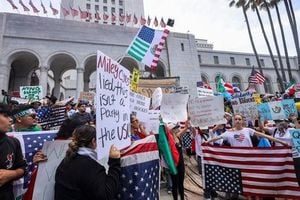In a series of moves that have sent shockwaves through the U.S. national security apparatus and its closest allies, Director of National Intelligence Tulsi Gabbard has taken unprecedented actions that critics say threaten the foundations of American intelligence cooperation and internal trust. On July 20, 2025, Gabbard issued a directive that classified all analysis and information related to the Russia-Ukraine peace negotiations as "NOFORN"—intelligence jargon for "no foreign dissemination." According to CBS, this order prevents even America’s closest intelligence partners—the so-called Five Eyes alliance, comprising the United Kingdom, Canada, Australia, and New Zealand—from receiving updates on these high-stakes talks. The move marks a dramatic break from decades of seamless intelligence sharing that has been a bedrock of Western security since the end of World War II.
Just a month later, on August 19, Gabbard made headlines again by revoking the security clearances of 37 current and former intelligence officials. The list, which Gabbard shared publicly, includes several high-profile Biden administration officials such as Maher Bitar, Emily Horne, and Brett Holmgren. Gabbard accused those named—without providing evidence—of politicizing or leaking intelligence or committing “intentional egregious violations of tradecraft standards.” She emphasized that the action was taken at the direction of President Trump, writing on X (formerly Twitter), “Being entrusted with a security clearance is a privilege, not a right. Those in the Intelligence Community who betray their oath to the Constitution and put their own interests ahead of the interests of the American people have broken the sacred trust they promised to uphold. In doing so, they undermine our national security, the safety and security of the American people and the foundational principles of our democratic republic.”
The announcement was met with swift and harsh criticism from national security professionals, many of whom warned that the moves risked politicizing the intelligence process and undermining both morale and operational effectiveness. Mark Zaid, a prominent national security attorney who has represented clients whose clearances were revoked under the Trump administration (and who lost his own clearance in that period), didn’t mince words. “Can you say ‘Privacy Act violation’? I certainly can. Further proof of weaponization and politicization. The vast majority of these individuals are not household names & are dedicated public servants who have worked across multiple presidential administrations,” Zaid wrote on X. He also noted the unorthodox manner in which the revocation was handled, highlighting that the list was first published by the New York Post before those affected were even notified. “Pure politicization of security clearance process. These are unlawful decisions that deviate from decades of precedent. Completely unprofessional that individuals are targeted in [a] way that impacts their careers, yet they are not notified before leaking memo to friendly media,” he added.
Another voice of concern came from Larry Pfeiffer, who served as senior director of the White House Situation Room and as chief of staff at the CIA. Pfeiffer warned that the decision would ultimately harm U.S. intelligence capabilities. “The skill and talent that Trump and Gabbard deprive the US national security and intelligence communities, govt & private sector, is huge. Makes one wonder who they are really working for, directly, indirectly, or as useful idiots,” he posted, ending with a Russian flag emoji—a pointed reference to fears of foreign influence or benefit.
The list of those whose clearances were revoked is notable not just for its size but for its breadth. It includes individuals who have served under multiple administrations, from Clinton to Obama to Trump and Biden. Among them are officials who have publicly commented on Trump administration decisions, such as Beth Sanner, a longtime national security official and CNN analyst, Charles Kupchan, a former National Security Council staffer under both Clinton and Obama, and Sarah Vinograd, who worked at the NSC under Obama and at the Department of Homeland Security under Biden. The revocations also affected those who had signed a letter suggesting that the Hunter Biden laptop story bore hallmarks of Russian disinformation, as well as attorneys at major law firms.
Gabbard’s moves have led to a rare moment of unity among national security professionals, many of whom have spent their careers serving administrations of both parties. The reaction from within the intelligence community has been one of shock and dismay, particularly with regard to the Five Eyes decision. For decades, the Five Eyes alliance has represented the gold standard in intelligence cooperation, allowing the U.S. and its closest allies to share information freely and respond quickly to global threats. Cutting these partners out of sensitive updates on Russia-Ukraine peace talks, as reported by CBS, undermines not just daily operations but also the trust that has been painstakingly built over generations.
Some observers believe that these moves are part of a broader trend of politicization within the intelligence community, a trend that began under Trump and has now escalated. The public naming of individuals whose clearances were revoked, coupled with accusations made without supporting evidence, has fueled concerns about due process and the potential chilling effect on career professionals. As Mark Zaid pointed out, many of those affected “are dedicated public servants who have worked across multiple presidential administrations.”
Meanwhile, the decision to classify Russia-Ukraine peace negotiations as NOFORN has left America’s allies scrambling for information and forced them to rely on their own, often more limited, intelligence resources. The Five Eyes network, which was born out of the ashes of World War II, has been credited with helping to prevent terror attacks, uncover cyber threats, and counter foreign espionage. To suddenly exclude these partners from a matter as consequential as the Russia-Ukraine talks is, in the words of one stunned intelligence official, “unthinkable.”
Yet supporters of Gabbard and Trump argue that the moves are necessary to restore integrity to the intelligence process and to ensure that sensitive information does not fall into the wrong hands. They maintain that security clearances are a privilege, not a right, and that those who have shown disloyalty or poor judgment should not be entrusted with access to the nation’s secrets. Gabbard herself underscored this point in her public statement, insisting that “those in the Intelligence Community who betray their oath to the Constitution...undermine our national security.”
The debate over these actions is far from settled. On one side are those who see the moves as a long-overdue correction to what they view as a politicized and sometimes unaccountable intelligence bureaucracy. On the other are those who warn that such steps risk hollowing out America’s intelligence capabilities and alienating trusted allies at a time of mounting global challenges.
As the dust settles, one thing is clear: the decisions made by Tulsi Gabbard in the summer of 2025 will reverberate through the corridors of power in Washington and capitals around the world for years to come. Whether these actions will ultimately strengthen or weaken America’s national security remains to be seen, but for now, the intelligence community—and its partners—are left grappling with the consequences.




